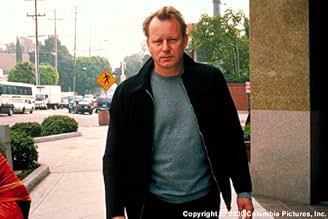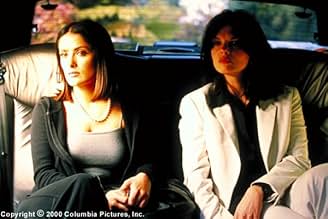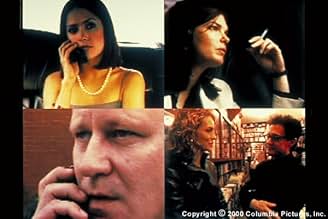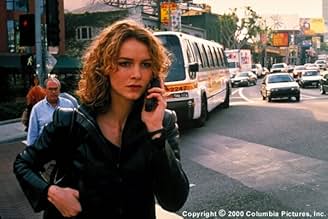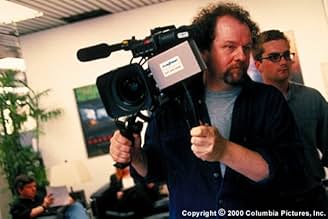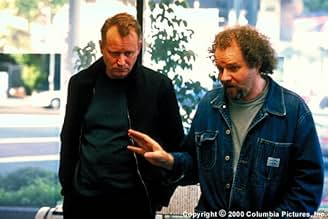AVALIAÇÃO DA IMDb
6,0/10
7,2 mil
SUA AVALIAÇÃO
Quatro quadros de ação simultânea que seguem alternadamente uma apaixonada amante lésbica enquanto ela fica obcecada com os flertes de sua parceira e os acontecimentos tensos de uma produtor... Ler tudoQuatro quadros de ação simultânea que seguem alternadamente uma apaixonada amante lésbica enquanto ela fica obcecada com os flertes de sua parceira e os acontecimentos tensos de uma produtora de filmes de Hollywood.Quatro quadros de ação simultânea que seguem alternadamente uma apaixonada amante lésbica enquanto ela fica obcecada com os flertes de sua parceira e os acontecimentos tensos de uma produtora de filmes de Hollywood.
- Prêmios
- 2 indicações no total
Enredo
Você sabia?
- CuriosidadesThe actors and actresses were responsible for their own costumes, hair, and make-up.
- Erros de gravaçãoCameraman reflected on an elevator door as he follows Emma after the therapist sequence.
- Versões alternativasThe film was transferred from digital video to film stock for theatrical presentation. The video release, however, uses the original digital video picture format.
- Trilhas sonorasComfort Of Strangers
Written by Mike Figgis, Anthony Marinelli and Skin
Performed by Skin
Courtesy of Virgin Records Limited
By Arrangement with Red Mullet Ltd.
Avaliação em destaque
Mike Figgis does a Robert Altman. Except, instead of creating a large narrative of interconnecting plot strands, he puts them all on four split screens. Is this therefore more subversive than Altman? I don't think so - Altman's method is an attack on Hollywood linearity, on conventional methods of 'connection'; his characters exist is the same space but are emotionally etc. miles apart. The characters in 'Short Cuts', like the city of L.A. itself, are a mass without a centre. Figgis, for all the supposed diffusion of his visual strands, actually reunites, glues together Altman's ruptures. In this way it might seem a more optimistic kind of film. It isn't.
'timecode' is being touted as a revolution in cinema, a new way of watching films. Instead of watching one screen and being led by a director, we are given four, and asked to make our choices. I was surprised at how panicked I was at this in the first 20 minutes, darting between scenes, wondering which one I should follow. This forced me out of the film much more disturbingly than anything by Fassbinder or Godard. But this alienation is deceptive. Firstly we are not really bombarded by four narratives - put 'pierrot le fou', 'diary of a country priest', 'vampyr' and 'branded to kill' on four screens, then you'd be confused. Figgis leads you all the way, gives you an illusion of choice, but rarely fulfils it. The focus is on one screen at a time - either the soundtrack is turned up loudest, the plot is more interesting, whatever. For long periods of time, you can safely ignore other scenes because there is nothing going on - for about 20 minutes, for example, Lauren sits in a limousine listening to a bug planted on Rose; this leaves us free to watch another screen and see what she's listening to. Other scenes are merely tedious - eg Emma droning to her shrink (a nod to Godard's 'week end', that famous end of cinema?) - so that you gladly look elsewhere. It is possible to listen to one scene, and flit around at the others to catch up on what's going on.
What I'm saying is, 'timecode' is not a difficult experience - after the initial adjustment, you watch the film as you would any other, especially as all the stories converge and are really only one story. Even at the beginning, the feeling is less one of Brechtian alienation than akin to being a security guard faced with a grid of screens - you rarely think about the physical processes of film or performance, as you would in a Dogme or Godard film.
So if 'timecode' is less revolutionary than it seems, that doesn't mean it isn't a brilliant film, a real purse in a pig's ear of a year (or whatever the expression is). One reason for this is the four-screen structure: I would have to watch it a few more times, but I was very conscious of the orchestration of the screens, the way compositions, or camera movements, or close-ups etc., in one screen were echoed, reflected, distorted in the others - a true understanding of this miraculous formal apparatus would, I think, give us the heart of the film, and bely the improvised nature of the content. Figgis is also a musician - he co-composed the score - and the movement here, its fugues and variations are truly virtuosic, almost worthy of my earlier Altman comparison.
But the content is great fun too. At first I was disappointed at the self-absorbed drabness of the material, the idea that we shouldn't be made to work too hard because we've enough to deal with the four screens. And, it is true, that the stories rarely transcend cliche. But, such is the enthusiasm of the performers (people like Salma Hayek obviously relishing slightly more useful roles than the bilge they're usually stuck in); the precision of the structure; the mixture of comedy and pathos, and the way the style facilitates both, that you're convinced you're watching a masterpiece. Quentin's massaging and Ana's pitch are two of the funniest things I've seen in ages, while Stellan Skarsgard's rich performance stands out all the more for its brittle surroundings.
'timecode' is being touted as a revolution in cinema, a new way of watching films. Instead of watching one screen and being led by a director, we are given four, and asked to make our choices. I was surprised at how panicked I was at this in the first 20 minutes, darting between scenes, wondering which one I should follow. This forced me out of the film much more disturbingly than anything by Fassbinder or Godard. But this alienation is deceptive. Firstly we are not really bombarded by four narratives - put 'pierrot le fou', 'diary of a country priest', 'vampyr' and 'branded to kill' on four screens, then you'd be confused. Figgis leads you all the way, gives you an illusion of choice, but rarely fulfils it. The focus is on one screen at a time - either the soundtrack is turned up loudest, the plot is more interesting, whatever. For long periods of time, you can safely ignore other scenes because there is nothing going on - for about 20 minutes, for example, Lauren sits in a limousine listening to a bug planted on Rose; this leaves us free to watch another screen and see what she's listening to. Other scenes are merely tedious - eg Emma droning to her shrink (a nod to Godard's 'week end', that famous end of cinema?) - so that you gladly look elsewhere. It is possible to listen to one scene, and flit around at the others to catch up on what's going on.
What I'm saying is, 'timecode' is not a difficult experience - after the initial adjustment, you watch the film as you would any other, especially as all the stories converge and are really only one story. Even at the beginning, the feeling is less one of Brechtian alienation than akin to being a security guard faced with a grid of screens - you rarely think about the physical processes of film or performance, as you would in a Dogme or Godard film.
So if 'timecode' is less revolutionary than it seems, that doesn't mean it isn't a brilliant film, a real purse in a pig's ear of a year (or whatever the expression is). One reason for this is the four-screen structure: I would have to watch it a few more times, but I was very conscious of the orchestration of the screens, the way compositions, or camera movements, or close-ups etc., in one screen were echoed, reflected, distorted in the others - a true understanding of this miraculous formal apparatus would, I think, give us the heart of the film, and bely the improvised nature of the content. Figgis is also a musician - he co-composed the score - and the movement here, its fugues and variations are truly virtuosic, almost worthy of my earlier Altman comparison.
But the content is great fun too. At first I was disappointed at the self-absorbed drabness of the material, the idea that we shouldn't be made to work too hard because we've enough to deal with the four screens. And, it is true, that the stories rarely transcend cliche. But, such is the enthusiasm of the performers (people like Salma Hayek obviously relishing slightly more useful roles than the bilge they're usually stuck in); the precision of the structure; the mixture of comedy and pathos, and the way the style facilitates both, that you're convinced you're watching a masterpiece. Quentin's massaging and Ana's pitch are two of the funniest things I've seen in ages, while Stellan Skarsgard's rich performance stands out all the more for its brittle surroundings.
- the red duchess
- 1 de out. de 2000
- Link permanente
Principais escolhas
Faça login para avaliar e ver a lista de recomendações personalizadas
- How long is Timecode?Fornecido pela Alexa
Detalhes
Bilheteria
- Orçamento
- US$ 5.000.000 (estimativa)
- Faturamento bruto nos EUA e Canadá
- US$ 1.057.750
- Fim de semana de estreia nos EUA e Canadá
- US$ 93.148
- 30 de abr. de 2000
- Faturamento bruto mundial
- US$ 1.431.406
- Tempo de duração1 hora 37 minutos
- Cor
- Mixagem de som
- Proporção
- 1.85 : 1
Contribua para esta página
Sugerir uma alteração ou adicionar conteúdo ausente



